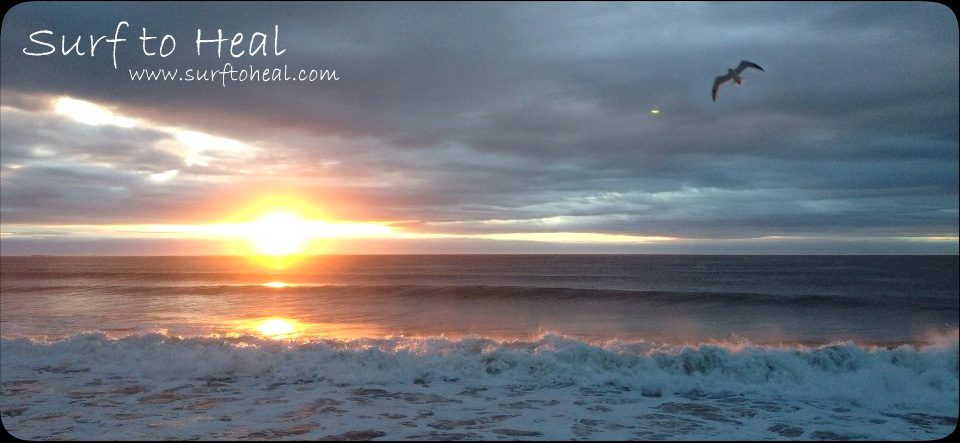Surf to Heal: Finding Your Best Self in the Surf


Individual Surf Sessions and Self-Development Classes
Surfing provides a great metaphor for life and overcoming the hardships involved in it. Surf to Heal focuses on building self-esteem, overcoming fears, building integrity through personal responsibility, and cultivating intimacy with yourself. Earnestly working on these goals creates a synergy and clarity that will lead to walking on the lifepath that is right for you. Surfing can help with more abstract problems, like harnessing the emotions to get you through the pain of a breakup or divorce. Surfing can also help your life on a more practical level as well, and is a great way to help you understand the importance of focusing on the small steps you take toward your bigger goals.
Surfing can help you:
Learn how to find joy and freedom within yourself
- Build up your confidence to apply to other challenges you're facing
- Learn how to overcome negativity that's holding you back from your true potential
- Access positive emotions and feel more positive about your life
- Gain perspective
- Access your Personal Power
- Handle rejection so that you feel 'rejection proof'
- Recover from a breakup
The Concept:
Sometimes a problem has been a problem for so long it is difficult to recognize it. Even if you do recognize it the idea, alone, feels overwhelming. It’s also possible that you’ve thought about it for so long or that it is part of a repetitive pattern of thinking, that sitting around and talking about it, in and of itself, may not be enough to shake things up and get things moving in your life. In fact, if it is part of an anxiety process, talking about it repetitively may make the anxiety worse. Exercise has been shown in extensive research, some using actual brain scans, to significantly reduce anxiety. What better way to integrate this into the counseling process than by being in a position to have this be an active part of the session? Swimming is an excellent form of exercise, among many different types of exercise people can engage in for the purposes of managing anxiety, depression, etc.
As a therapist I can recommend that you take action, change your lifestyle, get into an exercise routine, advise thought stopping or exposure strategies... or we can change the whole scene where we do the work, and actively apply these concepts in vivo. I find that clients’ motivation outside the session wanes and it has long been documented that lack of progress in therapy is related to clients not applying emotional regulation skills independently outside of the session.
Part of the concept behind Surf to Heal is that immersing oneself in the water, and connecting with the rhythm of nature is healing in and of itself. This is also a concept inherent in Adventure Therapy, which has become quite popular in the last decade. Outside of the the inherent therapeutic effects of being in the ocean or connecting with nature, surfing is a great metaphor for life and overcoming the hardships involved in it. It takes persistence and teaches each surfer, novice and veteran alike, that each challenge is an opportunity to either give up or learn from and become stronger. Surfing is also a great way to overcome fear. Who is not afraid being out in the open ocean, especially when a wave is walling up in front of you, while you are out there alone floating on a board? I believe most people think surfing is something they are not able to do. I certainly had this thought, but by going out and doing it, even on my worst days when all I did was fall, I overcame many self-limiting beliefs. Surfing was a large part of my own healing process a few years ago. Bottom line, why would I not share something that I found so profoundly healing to others just because it seemed out of the norm?
A few potential benefits of surfing include (in addition to those mentioned above):
- Being on the ocean can be help you break the monotony of your everyday life, reduce an overly future oriented focus, and be a place where you can overcome your fears.
- Breaking the mundane routine in life can bring about many revelations and insights about the important relationships in your life that you have been neglecting or your life direction
- Help people overcome problems with deficits of confidence to be able to get out there and do something they may have previously imagined they couldn’t do.
My life and my practice is about overcoming fear, pain and adversity and coming out a stronger and more resilient person from it. This is what I want to share with people in need of guidance to navigate the fear, pain, and adversity they’ve experienced in their own life. I certainly don't believe that surfing can heal "all" wounds in and of itself, but there are certainly a lot of people who feel this way, as does the man who signed the picture above. I do believe it is one avenue that has great potential to provide what people need to heal, and would love to be your guide in this process.
The Process:
If you are not already a surfer, (1) do not attempt surfing unless you already know how to swim, (2) checked with your doctor that you are in good enough physical health to engage in surfing as it is a strenuous activity, and (3) I strongly recommend you take some surfing lessons on the basics of how to surf and surfing safety before scheduling a surf session!
I am not a surf instructor, and the purpose of a Surf Session is not surfing instruction.
The focus of surf sessions is to provide an alternative format to the traditional therapy session to foster experiential learning on how to find joy and freedom within yourself in the face of life's hardships, overcoming general fears and/or beliefs that have been limiting for you in your life, to provide specific psycho-education about regulating emotions or changing perspectives that have fed symptoms rather than wellness, and applying specific skills that supplement your therapy.
See you at the beach!
Exercise has been shown to significantly reduce anxiety:
http://well.blogs.nytimes.com/2013/07/03/how-exercise-can-calm-anxiety/?ref=health&_r=2&
http://www.surfershealing.org/history.html
http://www.oprah.com/own/The-Swell-Life-Surfers-Healing
http://www.cphins.com/legalresources/bulletin/treatment-outside-office
http://en.wikipedia.org/wiki/Adventure_therapy
Minimum age to participate is 4 years old. If you or your child CANNOT swim, you must bring a Coast Guard Approved PFD (Personal Flotation Device). You must complete and sign the waiver and bring it with you for your session. You should print one for your records but you do not need to bring it with you to the event. You will only need one waiver for the entire surf tour this season if you choose to attend more than one event.
If you are over 18, fill out all the necessary forms availble online at www.danbolton.com/paperwork and complete the waiver. Only register the participant, not any other persons or family members. If you are signing up on behalf of somebody else remember to register them with THEIR information, not yours.
If you're interested in volunterring to help out at a larger event, the minimum age to volunteer is 10 years old as of the event date. The majority of volunteers needed are in the water. You do not need to know how to surf to volunteer. We need to have volunteers at the shoreline and mid break. If you are not willing to volunteer in the water, please do not register.
YOU MUST BRING A VALID PHOTO ID WITH YOU TO REGISTRATION WHEN YOU CHECK IN.
